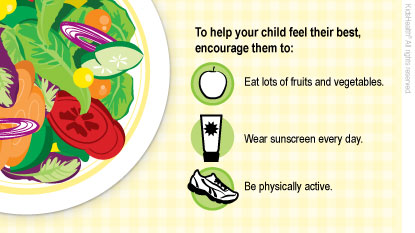Most people with lupus have times when the illness is active (a flare) and when it is quiet (remission). Follow these instructions to help your child feel their best and lower the risk of a lupus flare.

Things to know about preventing a lupus flare:
- Medicines help prevent lupus flares: Give all medicines that the health care provider prescribed. Do not stop any medicines without talking to the health care provider first.
- Some medicines can cause lupus flares: Check with your health care provider before you give any other medicines (including over-the-counter medicines and herbal supplements).
- Exhaustion can lead to a lupus flare: Help your child get enough rest. Kids with lupus need more sleep than other kids.
- Sunlight and ultraviolet light (for example, from halogen or fluorescent lights) can cause a lupus flare:
- Your child should wear sunscreen every day, even in winter. They should avoid the sun when possible and cover up with clothing and a hat when outdoors.
- Your child should avoid indoor tanning salons.
- Replace indoor lights with LED lights.
- Stress can cause a lupus flare: Help your child find ways to relax, such as deep breathing, meditation, or yoga. Encourage them to talk about their feelings. Talking to a therapist or other mental health professional may help too.
- Smoking causes lupus flares and other health problems: Talk to your child about not smoking. They can get help to quit if they do smoke (smokefree.gov).
- Infections can lead to lupus flares. To help prevent infections, your child should:
- Wash their hands well and often with soap and water (scrub for at least 20 seconds).
- Get all vaccines recommended by the health care provider, including a flu shot every year.
- Wear a mask as recommended by your health care provider.
- Not share food or drinks with others.
- Not get piercings or tattoos.
- Help your child keep track of symptoms by writing them down in a notebook or on a phone. You may be able to find a pattern of what brings on a flare.
To help your child feel their best:
- Encourage your child to be active. Exercise keeps muscles strong and can give your child more energy.
- Help your child eat a healthy diet that is low in added sugar and salt and includes:
- plenty of fruits and vegetables
- whole grains such as oatmeal, brown rice, and whole-grain bread and pasta
- low- or no-fat milk products
- a variety of proteins (such as seafood, eggs, chicken, beans, and nuts)
- Help your child get enough calcium by giving 3–4 servings of low-fat dairy (or dairy substitute) products every day. Food and drink fortified with calcium (such as cereal and orange juice), and vegetables such as spinach, bok choy, and kale are also good sources of calcium.
- Ask the health care provider if your child needs any vitamin supplements.
- Ask the health care provider if your child should avoid any foods.
- Help your child learn about lupus. Information is available through your health care provider and online at Lupus.org.
- Go to all visits with the health care provider as recommended. Sometimes a lupus flare doesn't have symptoms you can see. Starting treatment right away can help prevent a more severe flare.
Also:
- Teens on birth control should talk to their health care provider about what type is best for them. People with lupus should not use some types of birth control.
- Pregnancy can cause serious health problems in someone with lupus. Also, some medicines that treat lupus can harm a developing fetus.

You have any questions, or your child has signs of a lupus flare such as:
- fever
- weakness
- tiredness
- joint pain or swelling
- hair loss
- loss of appetite or weight loss
- a rash
- mouth sores
- easy bruising or bleeding
- brown pee
- seeming confused or forgetful

What is lupus? Lupus is an autoimmune illness. This means that the body's immune system mistakenly attacks and damages healthy tissues. Lupus can attack different organs, including the skin, joints, kidneys, heart, and brain.
What is a lupus flare? A lupus flare is when the illness is more active. The immune system attacks healthy tissues and causes organ damage. This can mean that someone:
- has no symptoms, but then develops symptoms
- has symptoms that get worse
- has some symptoms, and then develops new symptoms
- has no symptoms but still has active lupus (for example, if the kidneys are attacked)
- has blood tests that show the disease is more active
How is lupus treated? There is no cure for lupus. But following the health care provider's instructions can make lupus flares less likely. Taking medicines can help:
- keep the immune system from attacking healthy cells
- lower inflammation (pain and swelling)
- treat other problems that happen because of lupus




